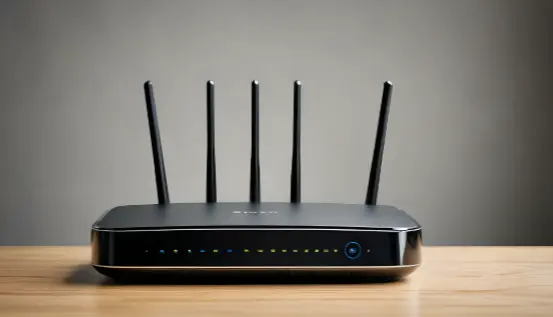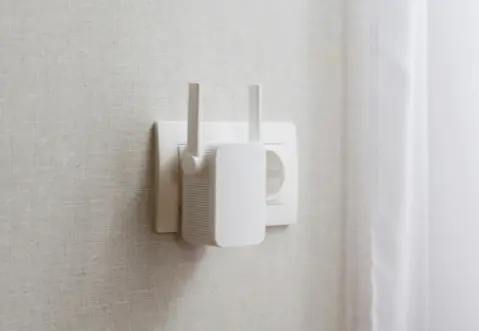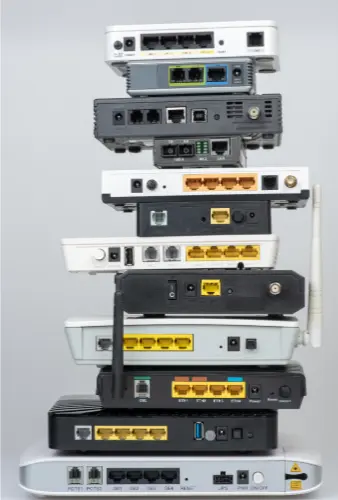Table of Contents:
WIFI Systems
Related Stories
Discover the top 5 reasons why Mesh WiFi systems outperform traditional routers and WiFi extenders for a seamless, reliable, and faster internet experience. If you’re tired of dead zones, dropped connections, and slow speeds, it’s time to upgrade your home network. Mesh WiFi offers superior coverage, scalability, and consistent performance, making it the best choice for large homes, multi-story buildings, and households with multiple smart devices.
This detailed guide explores why Mesh WiFi is the optimal solution for improving your internet connectivity, with comparisons to routers and extenders. Whether you’re a gamer, streamer, or remote worker, Mesh WiFi provides the uninterrupted speeds you need to stay connected. We also highlight popular Mesh WiFi systems like Google Nest WiFi, Netgear Orbi, and TP-Link Deco, explaining how they eliminate the limitations of traditional routers and extenders.
Get expert insights into how these systems handle high internet demands and offer easy setup, making them the perfect solution for tech-savvy homeowners. Learn how to choose the best internet solution for your home based on size, usage, and budget. If you’re searching for a way to enhance your internet speed, improve coverage, and say goodbye to connectivity issues, this post will guide you through the top benefits of Mesh WiFi. Stay ahead with the latest in networking technology and find out why Mesh WiFi is the future of home internet. Read more to ensure you’re making the right choice for a superior internet experience!
In today’s fast-paced, technology-driven world, a reliable and fast internet connection has become a necessity. Whether it’s for remote work, online gaming, smart home devices, or high-definition streaming, a stable internet connection is essential. As the demand for better coverage and faster speeds continues to grow, many people face challenges such as dead zones, slow speeds, and dropped connections. These issues are particularly prevalent in larger homes or environments with obstacles that disrupt signal flow.
This blog post will explore three key solutions for improving internet connectivity: traditional routers, WiFi extenders, and Mesh WiFi systems. By understanding how each works and their pros and cons, you’ll be able to make an informed decision about the best choice for your home or business.
Understanding the Basics: Routers, Mesh WiFi, and Extenders!

Traditional Routers

A router is the foundation of any home network, responsible for connecting all your devices to the internet. A typical router functions by broadcasting a WiFi signal from a central point, which devices like smartphones, laptops, and tablets connect to.
However, traditional routers have their limitations, particularly in large spaces or homes with multiple walls or floors. In such scenarios, the further away you are from the router, the weaker the signal becomes. This results in reduced speeds and unreliable connectivity in certain areas of your home, known as dead zones. Even powerful routers may struggle to cover large homes with consistent signal strength.
WiFi Extenders

WiFi extenders, also known as repeaters or boosters, were developed to tackle dead zones. These devices receive your existing WiFi signal from the router and re-broadcast it to extend coverage. They are typically placed between the router and the area where coverage is weak, thereby “boosting” the signal into that space.
While WiFi extenders can be a quick and affordable fix for coverage issues, they come with limitations. First, extenders can sometimes introduce signal degradation, which means that while the signal reaches further, the speed may be reduced. In many cases, they also create a separate network from the main router, requiring devices to switch networks as you move around your home, leading to interrupted connections.
Mesh WiFi Systems

Mesh WiFi systems represent a more modern solution to home networking. Rather than relying on a single router, Mesh WiFi consists of multiple nodes or satellites that work together to provide seamless coverage throughout a home. These nodes communicate with one another and create a unified network, ensuring that devices automatically connect to the nearest and strongest node as you move around.
The main advantage of Mesh WiFi systems is their scalability. Whether you live in a small apartment or a large, multi-story home, Mesh WiFi can adapt to your needs. It eliminates dead zones and provides consistent speeds across the entire coverage area. Unlike WiFi extenders, Mesh systems don’t require switching between networks.
Key Differences Between Mesh WiFi, Routers, and Extenders!

When it comes to improving your home internet experience, understanding the differences between routers, WiFi extenders, and Mesh WiFi is essential.
Range
Routers: Typically offer limited coverage, often struggling to provide strong signals in larger homes.
WiFi Extenders: Extend the range of your router but often at the cost of speed and may create network segmentation.
Mesh WiFi: Offers the best range by using multiple nodes to provide seamless coverage across large areas, eliminating dead zones.
Speed
Routers: Generally provide the fastest speeds near the router but suffer from significant speed drops as the distance increases.
WiFi Extenders: Can extend coverage but often at the expense of internet speed, as they rely on receiving and rebroadcasting signals.
Mesh WiFi: Provides consistent speeds across the entire coverage area, regardless of where you are in the home.
Coverage
Routers: Best suited for small to medium-sized homes or spaces with few physical barriers like walls and floors.
WiFi Extenders: Extend coverage but may not perform well in large or multi-story homes where obstacles interfere with signal flow.
Mesh WiFi: Ideal for large homes, multi-story spaces, or homes with multiple obstacles that may disrupt signal flow.
Ease of Setup
Routers: Relatively easy to set up but may require advanced configurations for more complex networks.
WiFi Extenders: Typically easy to install and affordable but may require placement adjustments to optimize performance.
Mesh WiFi: Often the easiest to set up, especially with app-guided installation, but may have a higher upfront cost.
Which One is Right for You?

Deciding between a traditional router, a WiFi extender, or a Mesh WiFi system depends on your specific needs. Here are some scenarios to help you make an informed decision:
Small to Medium Homes (Less than 2,000 sq. ft.)
If you live in a smaller home or apartment, a powerful traditional router may be all you need. With fewer physical obstacles and less space to cover, a good router can provide fast speeds and reliable connectivity.
Large Homes or Multi-Story Homes (More than 2,000 sq. ft.)
In larger homes, especially those with multiple floors, Mesh WiFi is typically the best option. Its scalability and ability to eliminate dead zones make it ideal for providing seamless coverage throughout the house. Routers alone may struggle to cover such large areas, while extenders can introduce issues with connectivity consistency.
Budget-Friendly Solutions
If you’re looking for an affordable solution and only have a few areas with weak signal, a WiFi extender might be a quick and cheap fix. However, if you have the budget for a long-term solution, a Mesh WiFi system is worth the investment.
Heavy Internet Users (Gaming, Streaming, Remote Work)
For heavy internet users who require consistent speeds throughout the home, Mesh WiFi is the best option. With traditional routers, speed decreases as distance increases, which can affect gaming, video calls, or streaming. Mesh WiFi offers consistent performance and ensures that all your devices get optimal connectivity.
Popular Mesh WiFi Systems, Routers, and Extenders on the Market!

Mesh WiFi Systems
Google Nest WiFi: Known for its sleek design and ease of use, Google Nest WiFi is perfect for users looking for a reliable and simple solution. It offers robust performance and seamless integration with other Google devices.
Netgear Orbi: A high-performance system that’s great for large homes. The Orbi provides excellent speeds and coverage, even in difficult-to-reach areas.
TP-Link Deco: A more budget-friendly Mesh system, Deco offers solid coverage and performance at a lower price point, making it ideal for users who want a Mesh solution without breaking the bank.
Routers
ASUS RT-AX88U: This high-performance router is ideal for gamers and those who need lightning-fast speeds. It offers excellent range and advanced features for heavy internet users.
Netgear Nighthawk RAX80: Another top contender for gamers and streamers, the Nighthawk is known for its robust performance and ability to handle multiple devices at once.
TP-Link Archer AX6000: A budget-friendly yet powerful router, the Archer AX6000 is great for users who want fast speeds and solid coverage without the high price tag.
WiFi Extenders
TP-Link RE650: This extender provides excellent range and speed for users who need to boost their existing router’s coverage. It’s an affordable and reliable solution for homes with weak signal areas.
Netgear EX6400: Known for its easy setup and reliable performance, this extender is a great option for users looking to fill in the gaps in their WiFi coverage.
Conclusion
Choosing between a traditional router, WiFi extender, or Mesh WiFi system depends on your unique needs and home layout. While routers work well in smaller spaces, they often struggle in larger homes with multiple obstacles. WiFi extenders provide a quick fix for weak signals but may introduce issues with speed and connectivity.
Mesh WiFi systems, though more expensive, offer the most reliable and consistent performance for larger homes or spaces with heavy internet demands.
In the end, your choice should be based on the size of your home, your budget, and your internet usage. If you’re looking for a long-term solution that can grow with your needs, Mesh WiFi is the optimal choice for an uninterrupted internet experience.
External References
Tom’s Guide: This guide compares various mesh Wi-Fi systems, emphasizing their ability to eliminate dead zones and provide consistent internet speeds throughout the home. Read More…
TechRadar: This comparison between Wi-Fi extenders and mesh routers explains why mesh systems offer a more seamless connectivity experience by using a single network. Read More….
CompareInternet.com: This article discusses the differences between Wi-Fi extenders, repeaters, and mesh Wi-Fi systems, noting that mesh systems often deliver the fastest speeds and most reliable connections. Read More….
XDA Developers: This piece outlines several reasons to choose a mesh Wi-Fi network, including whole-home coverage and stronger average speeds, even when far from the main router. Read More….












